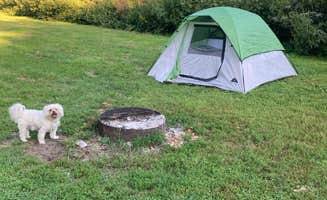Dispersed camping sites near Eyota, Minnesota offer primitive outdoor experiences in southeastern Minnesota's rolling bluff country. The area sits within the Driftless Region, characterized by deeply carved river valleys and forested ridges. Winter temperatures regularly drop below freezing, while summer months typically range from 70-85°F with moderate humidity and occasional thunderstorms.
What to do
Hiking local trails: Richard J Dorer Memorial Hardwood Forest features multiple hiking paths through native hardwood forests. "There are a few spaces with views you can hike in to but I opted for a spot next to my car. And ideal spot for a one nighter. I stopped here after a 12 hour drive got set up and even walked the trails for a few miles before bed," notes Demeri C. about the Richard J Dorer Memorial Hardwood Forest.
Biking access camping: Several dispersed sites connect to regional bike trails. Root River Canoe Campsite provides access via a fork in the bike trail leading directly to the site. The location supports bicycle-based camping excursions with minimal equipment needs.
Water activities: Paddlers can access free camping near Eyota through waterways. "This area is off a low maintenance dirt road. It is best to come in from the south as sometimes the gate on the river bridge to the north is closed," advises camper T S. about Zumbro Bottoms State Forest dispersed camping areas.
What campers like
Elevated camping spots: The ridge-top sites at Richard J Dorer Memorial Hardwood Forest provide panoramic valley views. "Lovely space" with hiking options makes it "ideal for a one nighter," according to recent visitor reviews.
Privacy and solitude: Many dispersed camping areas near Eyota see minimal traffic, especially on weekdays. At Root River Canoe Campsite, "it doesn't seem like people really camp here anymore," notes Michael V., providing solitude seekers with quieter alternatives to developed campgrounds.
No-cost options: Every identified dispersed camping location near Eyota provides completely free camping. Basic amenities vary by site but typically include designated fire rings and primitive toilet facilities without requiring permits or reservations.
What you should know
Access challenges: Some prime camping spots require physical effort. At Zumbro Bottoms State Forest, "There is a parking spot near a known dispersed camping site with easy vehicle access next to it. There are hiking trails that pass by this site," explains T S.
Changing terrain: Natural changes affect site conditions over time. Michael V. notes that at Root River Canoe Campsite, "the river changed course and is further away than it once was," which impacts water access for campers planning river-based activities.
Limited facilities: Most dispersed sites maintain minimal infrastructure. Water sources are inconsistent or absent entirely at many locations, requiring campers to bring sufficient supplies for their stay duration.
Tips for camping with families
Pack hauling equipment: When camping with children at elevated sites, bring assistance for transporting gear. Collapsible wagons prove particularly useful for moving supplies up inclines to reach premium spots with better views.
Bathroom considerations: Toilet facilities at dispersed sites typically consist of pit toilets without modern plumbing. Families should bring hand sanitizer, toilet paper, and potentially a portable toilet seat for younger children who may struggle with primitive facilities.
Easy-access alternatives: For families wanting a more accessible dispersed camping experience, Zumbro Bottoms State Forest provides vehicle-accessible sites that minimize hiking with gear while still offering a primitive camping experience.
Tips from RVers
Size restrictions: Dispersed camping areas near Eyota generally accommodate smaller camper vans and truck campers but lack facilities for larger RVs. None of the sites offer big-rig friendly access or hookups of any kind.
Road conditions: Access roads to many dispersed sites require high-clearance vehicles. For Zumbro Bottoms, approaching "from the south" is recommended as "sometimes the gate on the river bridge to the north is closed," which can prevent RV access entirely.
Self-contained requirements: RVers must bring all necessary supplies and plan for proper waste management. No sanitary dump stations exist at these primitive sites, requiring campers to transport waste to appropriate facilities elsewhere.


